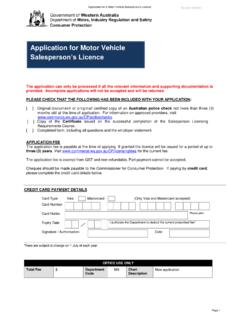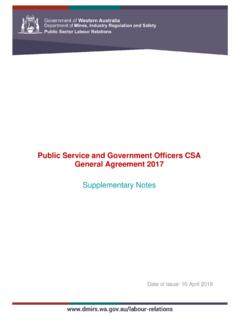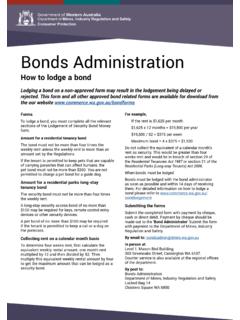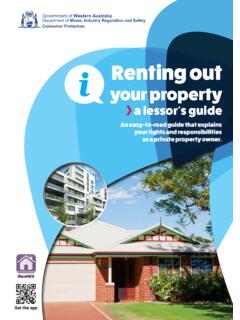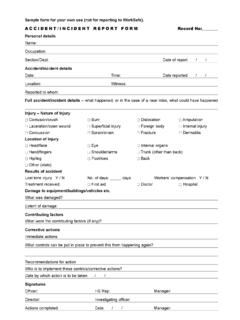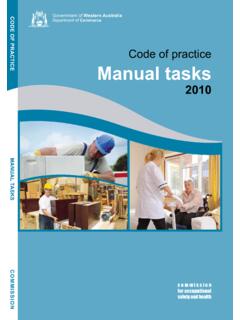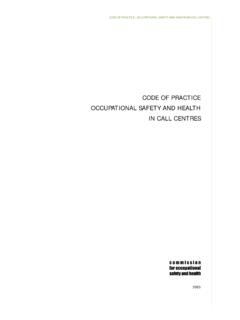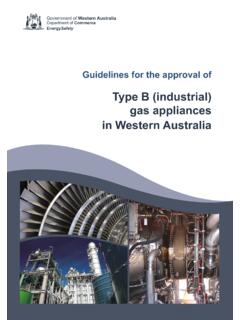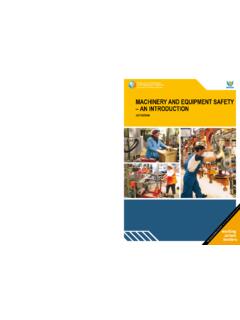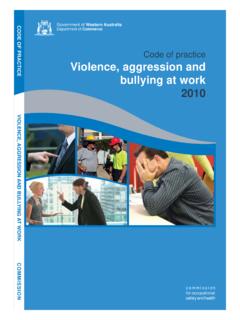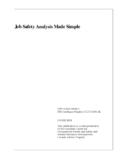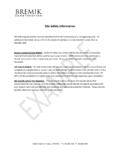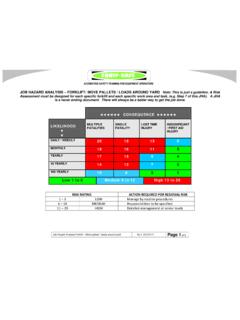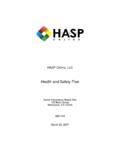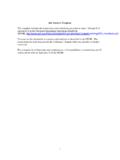Transcription of Job Safety Analysis (JSA) - Department of Commerce
1 Page 1 of 6 Job Safety Analysis (JSA) Ref: Version: Organisation Details Business details Business name: ABN: Contact person: Address: Contact position: Contact phone number Contact email address: Job Safety Analysis details Work activity: Location: Who are involved in the activity: This job Analysis has been authorised by: Name: .. Position:.. Signature: .. Date: .. Plant and equipment used: Maintenance checks required: Tools used: Materials used: Personal protective equipment: Certificates, permits and/approvals required Relevant legislation, codes, standard MSDSs etc applicable to this activity Page 2 of 6 Risk assessment **Use the risk rating table to assess the level of risk for each job step. Likelihood 1 2 3 4 5 Consequence Rare The event may occur in exceptional circumstances Unlikely The event could occur sometimes Moderate The event should occur sometimes Likely The event will probably occur in most circumstances Almost Certain The event is expected to occur in most circumstances 1 Insignificant No injuries or health issues LOW LOW LOW LOW MODERATE 2 Minor First aid treatment LOW LOW MODERATE MODERATE HIGH 3 Moderate Medical treatment, potential LTI LOW MODERATE HIGH HIGH CRITICAL 4 Major Permanent disability or disease LOW MODERATE HIGH CRITICAL CATASTROPHIC 5 Extreme Death MODERATE HIGH CRITICAL CATASTROPHIC CATASTROPHIC Risk rating: Low risk: Acceptable risk and no further action required as long as risk has been minimised as possible.
2 Risk needs to be reviewed periodically. Moderate risk: Tolerable with further action required to minimise risk. Risk needs to be reviewed periodically. High risk: Tolerable with further action required to minimise risk. Risk needs to be reviewed continuously. Critical risk: Unacceptable risk and further action required immediately to minimise risk. Catastrophic: Unacceptable risk and urgent action required to minimise risk. Page 3 of 6 Risk controls The hierarchy of control can be used as an effective tool to deal with health and Safety issues at work. Use the type of control suggested as measures to deal with the hazard. Aim to use control measures from as high on the hierarchy of control list as possible. If that is not possible the next option down the list or a combination of the measures should be implemented. The least effective control measure is the use of personal protective equipment (PPE) and it should be used as a last resort or a support to other control measures.
3 Information and training should be integrated with all levels of control to explain how controls work. 1. Eliminate if it is possible, the hazard should be removed completely. For example, get rid of dangerous machines. 2. Substitute replace something that produces the hazard with something that does not produce a hazard. For example, replacing solvent based paint with water based paint. Risk assessment on the substitution must be conducted to ensure that it will not pose another hazard. 3. Engineering control isolate a person from the hazard by creating physical barrier or making changes to process, equipment or plant to reduce the hazard. For example, install ventilation systems. 4. Administrative control change the way a person works by establishing policies and procedures to minimise the risks. For example, job scheduling to limit exposure and posting hazard signs.
4 5. Use personal protective equipment (PPE) protect a person from the hazard by wearing PPE. For example, wearing gloves, Safety glasses, hard hats and high-visibility clothing. PPE must be correctly fitted, used and maintained to provide protection. Page 4 of 6 JSA Action steps Step No Job step details Potential hazards Risk rating** How to control risks** Name of persons responsible for work Review number: Version: Page 5 of 6 Step No Job step details Potential hazards Risk rating** How to control risks** Name of persons responsible for work Review number: Version: Page 6 of 6 This job Safety Analysis has been developed through consultation with our employees and has been read, understood and signed by all employees undertaking the works: Print Names: Signatures: Dates: Review No 01 02 03 04 05 06 07 08 09 Initial: Date: A10592057
